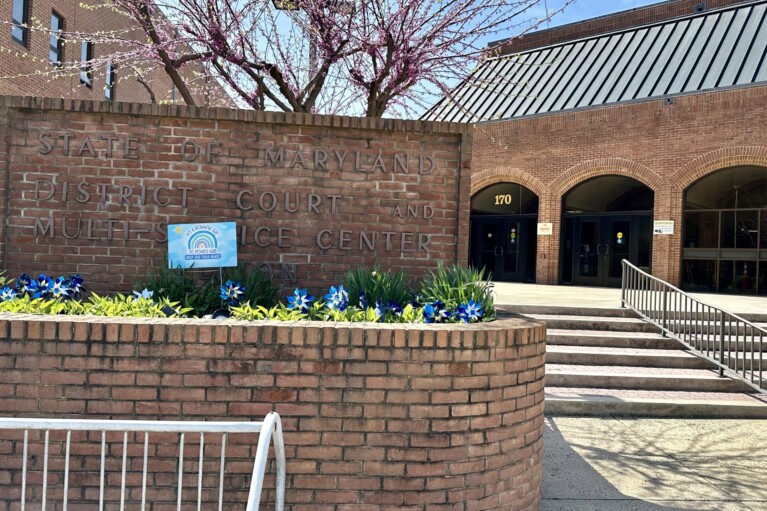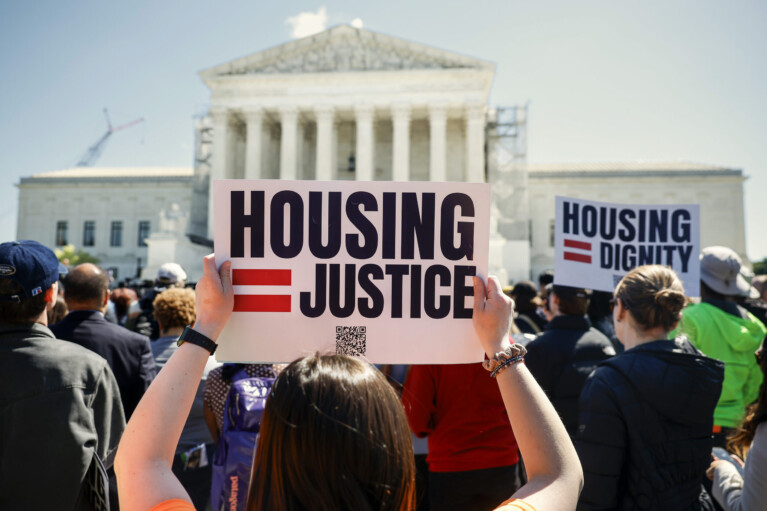Most circuit court ‘sitting judges’ win primary races, as debate continues over partisan judicial elections

In contrast to two years ago — when appointed circuit court judges in three major jurisdictions around the state failed to survive the process of winning election to a full 15-year term — 2022 is turning out to be a pretty good year for the so-called “sitting judges.”
But the perennial debate over the wisdom of choosing circuit court judges in Maryland in partisan elections — when appellate and district court judges are not subject to such a process — will again emerge in coming weeks; Maryland’s judicial branch is preparing to hold public hearings on the best way to select judges, with an eye towards the 2023 session of the General Assembly.
With results certified in five of the six counties in which circuit court judges initially appointed to the bench by Gov. Larry Hogan (R) late last year or early this year faced opposition in the July 19 primary, it appears that eight of nine challenged incumbents won both the Democratic and Republican nominations — thereby guaranteeing themselves of election to full terms in November.
In one instance, Charles County, the primary set up a general election faceoff, as the major party nominations went to different candidates. However, the incumbent judge, Monise A. Brown, overwhelmingly captured the Democratic nomination against two challengers, and — in a county where Democrats hold a 3-1 registration edge — begins the November campaign with a significant advantage against the Republican nominee, Sarah Freeman Proctor, a former Charles County assistant state’s attorney.
The sitting judges in Caroline and Howard counties, Heather L. Price and Stephanie P. Porter, respectively, easily won both parties’ nominations, and the incumbent in Washington County, Joseph S. Michael, also prevailed in both — although by a relatively narrow margin. In Prince George’s County, incumbent Carol A. Coderre took on four challengers in winning the Democratic and Republican contests. (See end of story for detailed results in all of the judgeship contests.)
Ballots are still being tallied in Montgomery County, where results are at least a week away from being certified. But the four sitting Circuit Court judges — Carlos F. Acosta, Theresa M. Chernosky, Kathleen M. Dumais, and Rachel T. McGuckian — appear to have accumulated prohibitive leads over two challengers, Thomas P. Johnson and Marylin Pierre, for the four judgeships at stake.
Two years ago, Pierre succeeded in capturing one of four available Democratic nominations – sparking a general election campaign notable for its acrimony, particularly when measured against the norms of recent judicial elections.
In the wake of the 2020 contest, it required three rounds of advertising to attract a large enough applicant pool for four Montgomery County Circuit Court judgeships opened by retirements in the ensuing months — intensifying concern in judicial circles about whether qualified applicants in Montgomery and elsewhere in the state are being scared off by a reluctance to engage in bare-knuckle politics.
“One thing is for sure — it is only going to get worse,” retired Montgomery County Circuit Court Judge Gary E. Bair wrote in an October 2021 article published by the county’s bar association. Noting that applications for district court judgeship openings are not shrinking, he added, “The big difference…is the possibility of contested elections for circuit court positions versus the district court judges, whose names we will never see on the ballot.”
Under the state’s constitution, district court judges are seated for 10-year terms after winning confirmation by the Maryland Senate. Appellate judges also serve 10-year terms with Senate confirmation, and then are subject to “retention” elections, where rank-and-file voters are simply asked to vote “yes” or “no” on a given judge. Retention votes of below 80% are a rarity.
However, circuit court judges, once appointed by the governor to fill a vacancy, must run in partisan primaries in the next election for a 15-year term.
Bair is the spouse of retired Maryland Court of Appeals Chief Judge Mary Ellen Barbera, who was an outspoken advocate of doing away with judgeship elections during her time on the bench.
Court of Appeals Chief Judge Matthew Fader, appointed to that post this spring, is said to share Barbera’s view — which has cleared the way for the forthcoming examination of this issue by the Maryland’s judiciary. Knowledgeable sources told Maryland Matters that the planned workgroup on this matter, which also has the support of administrative judges in the state’s 24 major jurisdictions, is expected to be up and running within three to four weeks.
In addition to members of the judicial bench, the workgroup will include stakeholders from other interested organizations. It will hold public hearings this fall to hear both sides of the debate on the question of compelling judicial candidates to face rank-and-file voters.
While involved sources acknowledged this exercise is fueled by a widespread desire within the judicial branch to remove judgeships from partisan elections, they said the forthcoming workgroup will take a broader look at the best options for selecting judges prior to submitting a report to the General Assembly before the end of 2022.
Among the topics for consideration: complaints that the current selection process involving bar association groups and trial court nominating commissions is not sufficiently transparent, and that the commissions — appointed by the governor and, consisting of all or mostly attorneys — should include more laypersons.
Supporters of the forthcoming exercise note there has not been a similar in-depth assessment since the 1960s. That led to the creation — in 1970, under then-Gov. Marvin Mandel — of the current structure of an appellate court nominating commission and 16 trial court nominating commissions, covering the state’s 24 major jurisdictions, to recommend nominees for circuit court and district court judgeships to the governor.
Attorneys seeking a judgeship must complete a lengthy questionnaire, providing extensive information on their professional and personal backgrounds. That questionnaire is disseminated to numerous state and local bar associations, who interview the candidates before they are vetted by the trial court nominating commission within their jurisdiction. The commission then sends a list of nominees to the governor, whose office conducts a third round of vetting before a final selection is made.
Critics of the current system note that any attorney, regardless of background or experience, can avoid such scrutiny by simply paying a $50 filing fee to get on the ballot. “Of course, this bypasses the extensive vetting process…that has worked quite well for 50 years — but try explaining that to the voters of Montgomery County,” Bair complained in his bar association journal article.
Defenders of the status quo — who have resisted legislative efforts to do away with judicial elections for well over two decades — say it has served as a fail-safe for minorities seeking such positions. But such sentiments appear to be softening as Hogan and his predecessors, Democrat Martin J. O’Malley and Republican Robert L. Ehrlich, have worked to bring racial and gender diversity to judicial appointments.
During the 2020 legislative session, former Circuit Court Judge William T. “Billy” Murphy — now a prominent Baltimore attorney — dropped his long-time opposition to doing away with judicial elections. Murphy, who is Black, backed a compromise proposal by Sen. Christopher R. West (R-Baltimore County) and then-Del. Erek L. Barron (D-Prince George’s) that would subject circuit court judge appointees to Senate confirmation, and exempt those confirmed with 80% or more of the Senate vote from facing an electoral challenge.
Advocates of change contend the underlying issues surrounding the current system of judicial elections persist, notwithstanding the relative ease with which most incumbent circuit court judges emerged from the July 19 primary.
By comparison, in 2020 one Hogan appointee dropped out of the running after failing to win the Democratic nomination in heavily Democratic Prince George’s County, and a second in the same county was defeated in the general election. Appointed incumbents also lost the general election to challengers in Charles and Howard counties.
There is speculation in judicial and political circles that the 2020 primary and general elections were significantly influenced by the immediacy of the George Floyd killing in Minneapolis and the emergence of the Black Lives Matter movement, leading to an anti-establishment wave that swept out several judicial incumbents. And, unlike 2022, it was a presidential election year, with a highly energized progressive wing of the Democratic Party brought out by Bernie Sanders’ candidacy,
Following is a county-by-county breakdown of the results of the circuit court judicial primaries on July 19, and thumbnail background information on the winners:
Caroline County (results certified by county board of elections)
Incumbent Heather L. Price defeated a single challenger, Maureen D. Keogh, winning 65% in the Democratic primary and 67% in the Republican primary to ensure election to a full 15-year term. Price, sworn in as a circuit court judge this past January, previously served for nine years as the Caroline County attorney.
Charles County (results certified)
Incumbent Monise A. Brown won 66.5% of the Democratic primary vote, to 22% for one challenger, Adrienne M. Davis, and 11.5% for the remaining candidate, Sarah Freeman Proctor. But Proctor came out on top of the Republican primary, with 46.3%, with Brown running second with 32.6% and Davis placing third with 21.1%.
Brown and Proctor, both former Charles County assistant state’s attorneys, will face off for the judgeship in the November general election. With nearly 74,300 registered Democrats in Charles County and only 24,000 registered Republicans, Brown starts out with the clear advantage.
Brown, Davis and Proctor were among a half-dozen applicants for the judgeship opening last year, with only Brown on the list of nominees sent by the county’s trial court nominating commission to Hogan. Before being sworn in as a Charles County Circuit Court judge this past February, Brown had served on the court as a family magistrate. Proctor most recently has served as chief of the special victims’ unit for the St. Mary’s County state’s attorney.
Howard County (results certified)
Incumbent Stephanie P. Porter won 67.6% of the Democratic primary vote and 79.7% in the Republican primary against challenger Alicia Altamirano. Prior to being sworn in as a Howard County Circuit Court a judge in January 2022, Porter spent seven years as a family magistrate on the court, and earlier was an assistant state’s attorney in Baltimore County for 14 years.
Montgomery County (results not yet certified)
The challengers, Thomas P. Johnson and Marylin Pierre, have yet to concede, but — given the number of votes remaining to be counted — it appears to be mathematically impossible for them to catch the four incumbents — Carlos F. Acosta, Theresa M. Chernosky, Kathleen M. Dumais, and Rachel T. McGuckian — in the race for four circuit court seats.
The gap in the Democratic primary between McGuckian, in fourth place, and Pierre, in fifth, stood at 36,600 votes early Wednesday — more than twice as many votes as the maximum of 16,000 mail-in and provisional votes remaining to be counted on the Democratic side. The latest results in the Democratic primary put Dumais at 22%; Chernosky, 21%; and Acosta and McGuckian each at approximately 20%; Pierre had 11% and Johnson 6%.
On the Republican side, there are just over 1,000 mail ballots remaining to be counted, according to the latest figures from the State Board of Elections, with McGuckian — in fourth place in the GOP primary — running more than 5,800 votes ahead of Johnson in fifth. The breakdown in that primary as of Wednesday: Dumais, 20.9%: Acosta, 19.5%; Chernosky, 19.4%; McGuckian, 19.3%; Johnson, 11.1%; and Pierre, 9.7%.
Pierre and Johnson sought to put the vetting process on trial this year, much as Pierre did two years ago, when she won enough votes in the Democratic primary to compete in the general election. By all accounts, however, this year’s primary was a tamer affair than the 2020 election, when Pierre infuriated the incumbents with hyperbole such as: “…They are an in-group. Most of them have worked at the same law firm, go to the same church and are related by marriage.” Later in the 2020 campaign, the campaign committee for the incumbents filed a restraining order against Pierre alleging that she and supporters were portraying her as an incumbent.
The apparent winners this year include: Acosta, a district court judge before moving to the circuit court this past January; Chernosky, who worked in the office of the Montgomery County Public Defender for two decades — the last four years as deputy district public defender — prior to becoming a judge last December 2021; Dumais, also sworn in as circuit court judge in December 2021 after two decades in the Maryland House of Delegates, including eight years as vice-chair of the Judiciary Committee; and McGuckian, who joined the court in January from the Rockville office of Miles & Stockbridge, serving as managing principal during her last four years there.
Prince George’s County (results certified)
Incumbent Carol Ann Coderre emerged from a five-way race to win both party nominations for a full term in her seat, capturing 28.9% in the Democratic primary (Malik Ali Shakur placed second with 24.05%) and 34.7% in the Republican primary, where Brandon Burrell finished behind her with 28%.
Coderre, who became a circuit court judge last October, has past ties to Prince George’s County Executive Angela Alsobrooks, serving as a deputy state’s attorney when Alsobrooks was Prince George’s County state’s attorney, and then moving to the executive branch to become a senior associate county attorney when Alsobrooks become county executive in late 2018.
Washington County (results certified)
Incumbent Joseph S. Michael joined the Washington County Circuit Court in March 2022 after nearly 30 years in the county’s office of state’s attorney, the last 18 as deputy state’s attorney. Shortly after his appointment, Hagerstown attorney Adam D. Greivell announced his intention to run for a full term in the seat.
Both candidates identified themselves as Republicans in a questionnaire for the Hagerstown Herald-Mail; Republicans hold the edge in voter registration in Washington County. In the Democratic primary, Michael won 54.9%, while narrowly besting Greivell in the Republican primary, taking 51.3%.
In the Herald-Mail questionnaire, Greivell went after Michael’s record in the state’s attorney’s office, charging: “My opponent admits pleading out 95% of his cases as a prosecutor. Our community is tired of slap-on-the-wrist plea deals and sentences.” Michael responded that “…as a prosecutor, criticism of plea agreements and suspended sentences was rare…Plea agreements and suspended sentences are a necessity to balance out the fact that courts have a finite capacity.”




 Creative Commons Attribution
Creative Commons Attribution